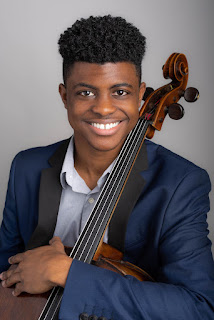Indianapolis Chamber Orchestra strings get a showcase in concert featuring a rising cello star
Music produced out of despair at wartime destruction with an overlay of shame made the Indianapolis Chamber Orchestra's performance of Richard Strauss' "Metamorphosen" timely Saturday night.
World War II was more of a cataclysm than Russia's current assault on Ukraine, so analogies must be tentatively applied. Strauss' reputation, long under a bit of an unjustified shadow because he remained in his native Germany throughout the Third Reich, has always had the benefit of reconciliation with the civilized world, thanks to this expansive showcase for 23 strings. Charles Conrad's program note sets Strauss' lack of complicity with the Nazi regime in a true light, without forced special pleadings.
ICO music director Matthew Kraemer capped a program featuring an excellent soloist – cellist Sterling Elliott — with the late Strauss work, the long-honored composer's response to the devastation both caused and endured by his homeland. The variation of texture and rhythms, applied to a handful of thematic elements, makes the nearly half-hour piece pass with bittersweet pleasure. The ICO strings rose to the occasion with firm ensemble, precise definition of phrases, and warm tone throughout.
 |
| Sterling Elliott soloed in Haydn. |
Double stops were assertive and the contrasts of register in the finale were especially thrilling. Intonation was dead-center, with very few momentary exceptions in rapid passages. Elliott's expressive command of everything in the solo part was never in doubt. Kraemer and the orchestra sounded fully in accord with the soloist, who seemed eager to keep coordination focused. Such forthright artistry begs to be encountered again.
The concert opened with an almost brand-new work by the Scottish composer Anna Clyne. "Sound and Fury" (2019) draws its title from the famous soliloquy in Shakespeare's "Macbeth." The words were projected through the hall's audio system at the piece's climax.
The work's orchestration was notable for chilling sweeps of marimba. The perpetual-motion orchestration at first seems overstated, but the composer's attempt to convey Macbeth's turbulent mental state is indelibly represented by the swirling strings. Later, fanfare figures recall the tragic hero's past martial success — the pathway to his overweening ambition, galvanized by his wife toward multiple murders.
A hymnlike episode sets up the recorded narration beginning with separated repetitions of the word "tomorrow." The music's suggestion of Shakespeare's imperishable words — how the relentless pace of time wears away everything we try to hold onto — was slightly disturbing. It was also satisfying to regard such a truth at arm's length through the scrim of arresting music.



Comments
Post a Comment